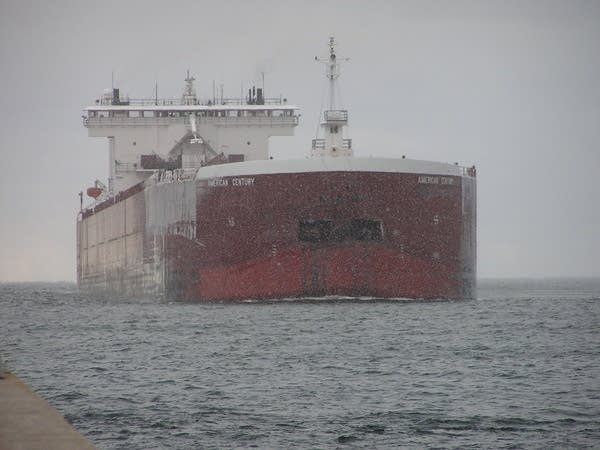Layoffs loom as Iron Range feels pinch of tough economy

It's a bitter afternoon in Duluth. A north wind whips snow squalls off Lake Superior, nearly obliterating the view of an arriving ship.
With just a hum from its massive diesel engines, the battleship-sized American Century slips almost silently between the port entry's concrete canal walls, under the waiting lift bridge, to the calm of Duluth's inner harbor.
These 1,000-foot vessels carry bulk commodities like taconite pellets for steel mills. But fewer are tying up along Duluth's ore docks.
"We've finally begun to see the impacts of the, I guess what we would term now the recession," said Adolph Ojard, Director of the Duluth Seaway Port Authority. "The steel mills have started to cut back. They're operating at 60 percent of capacity, which means they're consuming a lot less iron ore pellets."
Create a More Connected Minnesota
MPR News is your trusted resource for the news you need. With your support, MPR News brings accessible, courageous journalism and authentic conversation to everyone - free of paywalls and barriers. Your gift makes a difference.
Iron pellet shipments on the Great Lakes dropped more than 1 percent in October, compared to the previous October, according to a shippers group.
You can read the full report here.
Ojard said some ship owners are already calling it quits for the winter, a month or more earlier than usual.

"Three weeks ago we saw the first of several ships layup," Ojard said. "Several more have laid up in the lower lakes and everything I hear right now is that it will be an early end to the navigation season."
The dominoes are falling. With recession hitting demand for steel, that leads to cuts in demand for Minnesota iron and hurting the shipping industry that carries the iron. Iron, that was nearing $200 per ton in the spot market within the past year, now brings just over half that.
The downturn catches Minnesota's iron mining when it's planning to expand. Taconite producer KeeTac wants more capacity at its Keewatin plant. Mesabi Nugget is constructing the state's first iron nugget plant in Hoyt Lakes, and Essar Steel Minnesota broke ground just a month ago for their iron mine and steel mill near Nashwauk.
Even though the downturn has some taconite companies preparing for layoffs, Craig Pagel, President of the Iron Mining Association, said there's no sign companies are abandoning their expansion plans.

"You continue to look forward, not just react to what's happening over a 12 month period," Pagel said.
The same is true for the Iron Range's newest mining ventures.
Planning continues for a new surge in mining for metals like copper, nickel, platinum and gold. PolyMet Corporation hopes to begin work on a Hoyt Lakes mine next year. That's despite big hits in metals prices. Copper, around $1.70 a pound, brings less than half what it did a year ago. Frank Ongaro, with the industry group MiningMinnesota, said the projects are still viable.
"Every indication is that even with global demand reduced, domestic demand reduced, that long term, domestic and global demand will still see growth," Ongaro said. "And with metal prices down as they are, these are still extremely attractive projects."
Ongaro said precious metals like platinum and gold are important for modern electronics and other products.

"We don't see anybody going without cell phones and laptops and catalytic converters and all of the things that are essential to our daily lives," Ongaro said.
But the project's timing could be tricky. Credit markets are tight, and corporate bonds are particularly unpopular. Duluth College of St. Scholastica economist Tony Barrett said some projects may have to wait until the financial climate improves. But, he said the best projects should happen.
"The commodity business by nature is cyclical," Barrett said. "Anyone who has decided that they're going to invest in a plant, from scratch or an expansion, has made a long term determination of the profitability of that investment."
And those projects already underway could take advantage of recession. Falling prices can mean less costly energy, labor, and building components like structural steel.
But the question is whether or not the downturn will be so severe that it forces companies to pull back on their plans.
